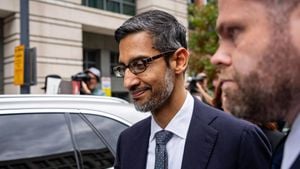Donald Trump’s potential second term as President of the United States is stirring much discussion, especially when it relates to the ever-evolving relationship between the U.S. and China. The phrase "Make America Great Again" could soon take on new meanings as the geopolitical chess game intensifies. With tensions simmering between the two nations, Trump’s actions and strategies could shape not only U.S.-China relations but the larger global scenario effectively.
Since Trump showered back onto the political scene with his announcement of running for president again, many have speculated about how his administration would approach foreign policy, particularly with regard to China. Observers assert he will likely adopt a stark shift from the policies implemented under President Joe Biden, which many criticize as lacking decisiveness and strength. Keyword here is engagement; Trump might focus on establishing firm positions to counter Beijing's growing influence.
China has been at the forefront of national security discussions, and addressing it is undoubtedly one of Trump’s top priorities upon resuming office. Analysts contend the previous administration viewed China as both a competitor and potential adversary, setting the tone for aggressive policies. This perceived new confrontation only seems to escalate as China aligns itself strategically with Russia, with both nations showcasing military camaraderie, particularly leveraging joint naval exercises.
The roots of the current U.S.-China tension were entrenched during the Obama administration and have only deepened under Biden, with accusations of weakness and indecision. Biden’s commitment to defend Taiwan unequivocally sent ripples through the diplomatic community, but follow-through has been lacking, leading many to argue China views America’s leadership as tepid.
Adm. Samuel Paparo, head of U.S. Indo-Pacific Command, conveyed the grim outlook: the U.S. military's dominance is waning, having suffered degradation through entanglements overseas, particularly through commitments to Ukraine and Israeli defense measures against Iran. This decline raises real concerns as Beijing continues ramping up its military capabilities. Paparo emphasized simply doubling down on technology and introducing drones won't suffice against the sheer number of Chinese military assets—suggesting the U.S. must bolster its traditional military forces.
Trump’s return may present the U.S. with the chance to re-engage with China assertively. Experts project he is unlikely to let Beijing bully Washington like under Biden's term. His style involves engaging directly and firmly with adversaries, which could lead to more respects or concessions from China. Yet, analysts caution Trump must also focus on reinforcing U.S. military capabilities and alliance partnerships to deter potential overreach by China.
Technologically, the Pentagon has been drafting strategies to reinforce its military prowess. The reality, though, is troubling. The U.S. faces significant manpower and logistics challenges. Pentagon officials acknowledge their capabilities today do not guarantee military success against China, without adequate readiness and resources. Critics stress the immediate need for repairs within military procurement and logistics operations, particularly concerning naval capabilities.
China’s own messaging has been aggressive, particularly surrounding Taiwan. Xi Jinping’s government has upped its rhetoric, asserting intentions over Taiwan, claiming reunification as inevitable. Many U.S. military analysts suggest any miscalculation or mishap during military exercises could result inherently dangerous; mistakes resulting from perceived provocations could trigger all-out conflict. During his forthcoming term, Trump must prioritize consistent communication and military readiness to confront such eventualities.
The South China Sea remains another flashpoint with China aggressively patrolling waters claimed by multiple nations. Here, any semblance of U.S.-China stability hangs by threadbare diplomatic channels. Military posturing could morph swiftly, intensifying conflicts if not managed well. Trump will face the immense challenge of preventing war-like scenarios from spiraling out of control, making effective communication with Xi Jinping and other allies utterly imperative.
On the broader scope, NATO's pivotal role is underlined as they align interests and bolster military readiness. Cooperation among Arctic nations has deepened with recent exercises reaffirming commitments, thereby potentially releasing U.S. forces from commitments elsewhere, like Ukraine, paving the path for greater focus on the Pacific.
Trump must also assess shifting alliances, especially with potential regional partners like India, Japan, and Australia. Collectively, they represent formidable trade and military alliances against China, each sharing concerns about Beijing’s ambitions. Lasting strong ties could dampen China’s influence amid the Indo-Pacific stability narrative.
The balance of power remains delicate. Donald Trump faces unprecedented obstacles intertwining trade disputes and military challenges, ranging from economic leverage to territorial hostilities. Revamping relationships and cultivating partnerships within established alliances presents much opportunity, yet demands considerable diplomatic efforts.
Overall, the direction Trump chooses to take will undoubtedly shape the narrative surrounding U.S.-China relations, with ramifications echoing throughout global geopolitics. Only time will reveal if the Pacific Dragon can be tempered.”



